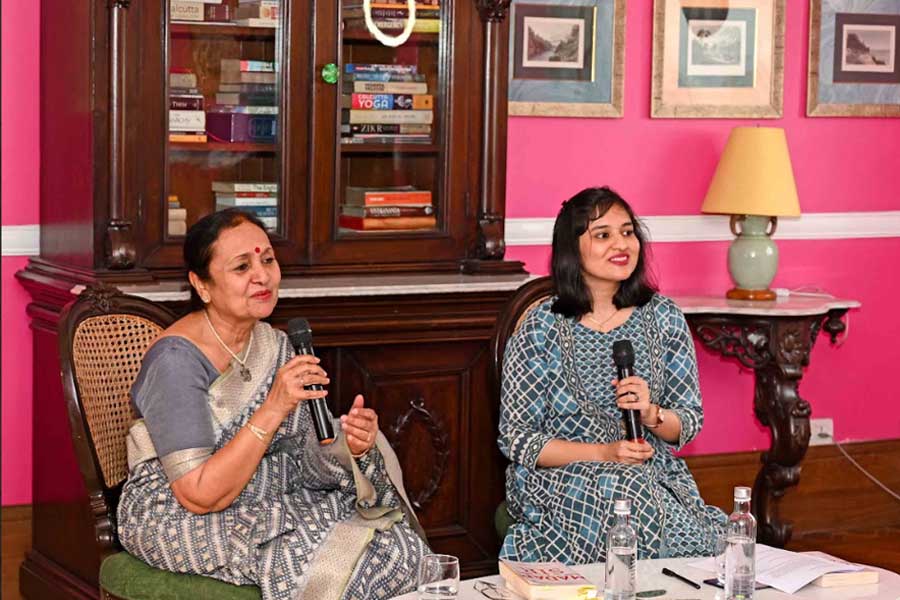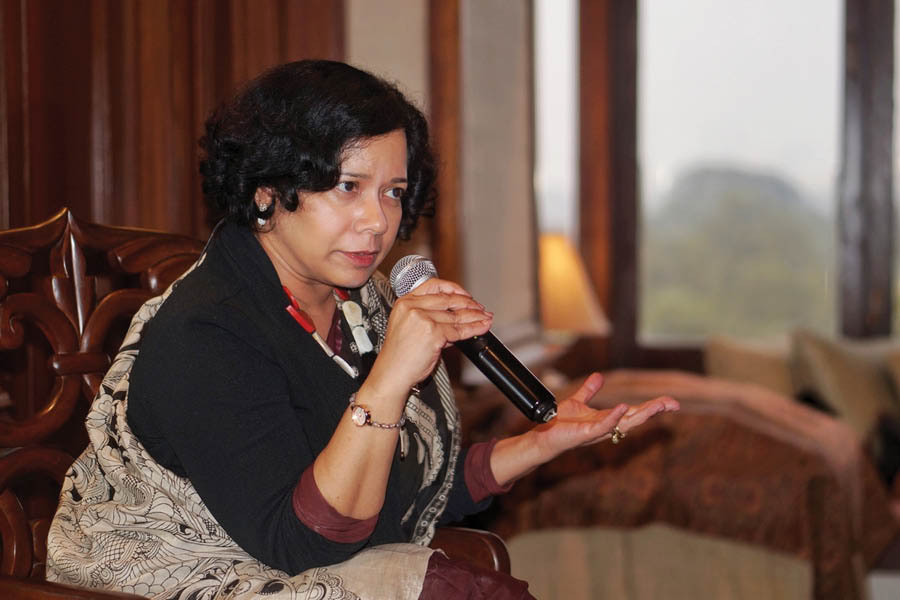Imagine that you are a child once again. You’ve come home from a long day at school. Your friends are calling you to play. Lately, there has been one specific game of which you can’t seem to get enough. Chor-police — an exhilarating espionage involving running, hiding, chasing.
For Manjari Jaruhar, this game was her life. She was the first woman IPS officer of Bihar, and among the first five ever in the country. Manjari struck an, ah well, arresting figure as she harked back to anecdotes which reshaped the contours of law enforcement that transcended the traditional dynamics of gender — all in pursuit of a safer, more equitable society. Ramona Sen, author and journalist, took Manjari through her experiences of navigating a male-dominated terrain at a session of the Glenburn Culture Club organised by the Prabha Khaitan Foundation and supported by My Kolkata.
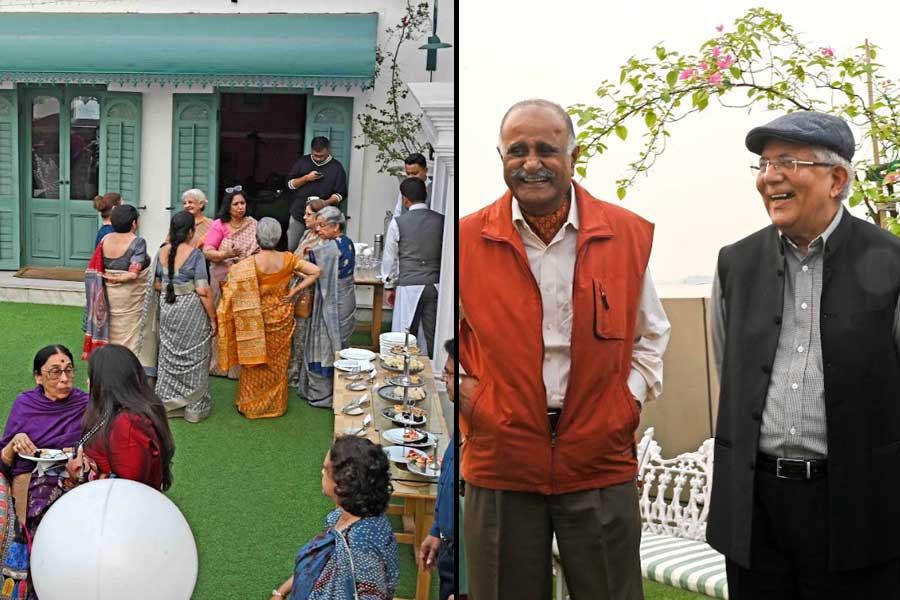
L-R: Guests mingle during high tea ahead of the session at The Glenburn Penthouse, and Rakesh Jaruhar, the author’s husband, with (right) S. Ramakrishna
Manjari Jaruhar’s book, titled Madam Sir — which was what she was often referred to on the field — begins by painting the story of a young girl living a sheltered life, the apple of her grandparents’ eyes, with a seemingly traditional future planned out for her. However, her life takes unexpected twists and turns, as this delicate little girl is reborn in the police academy, fighting stereotypes as well as crimes, and blazing a trail for hundreds after her.
“Growing up, my parents were mainly busy with the politics of the village, and my sister and I were often left with our grandparents,” said Manjari, while speaking of her childhood. “They were extremely disciplined and expected the same of us. The focus was that we should be good at our studies, and we should be groomed properly.” It was this same strict upbringing that held Manjari in good stead when she joined the Indian Police Service. The very act of prioritising a career of her choice – that too, one considered unconventional for her status and gender – was an act of rebellion against her otherwise conservative family.
“From learning how to stitch and paint, I suddenly took the plunge and sat for the very challenging Civil Services examinations.” Manjari writes in her book that the IPS training made her acutely aware of the gaps in her upbringing, and how it was an unfortunate norm to not encourage girls to take up sports or physical work. As a grandmother of two little girls, she has taken it upon herself to try and ensure that her grandchildren pursue at least one sport seriously in their lives.
Take out Kiran Bedi’s file!
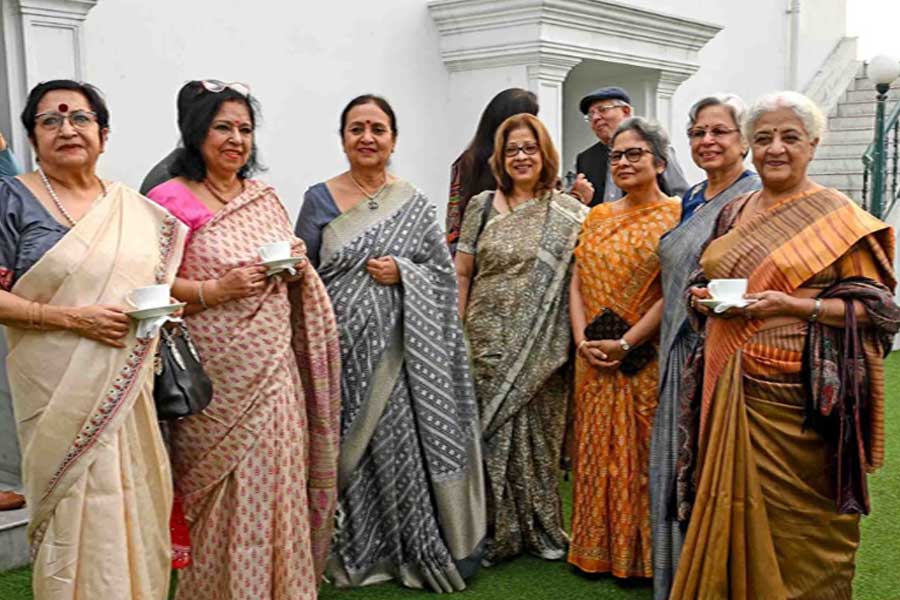
Manjari Jaruhar with her friends
Manjari’s time in the CID proved to be the most difficult posting of her career. “I was looking forward to working in my state as the first female police officer of Bihar, but, to my shock, it was a huge pushback,” she recalled. “The DG didn’t want me, he didn’t know what to do with me. He demeaned me by telling me that he would have to take out ‘Kiran Bedi’s file’ to determine what to do with me! Everybody got their postings by that evening. I was told to wait. After an intermittent wait, I was posted to the CID. I sat day after day for nearly six or seven months in a small cubicle just looking at files, with nothing else to do. By this time, all of my batchmates had gone to their subdivisions and started their work. I never gave up, and worked diligently on every file I got. The seniors were impressed, and then the chief minister declared that all Crimes Against Women cases in the state would now be investigated by me!”
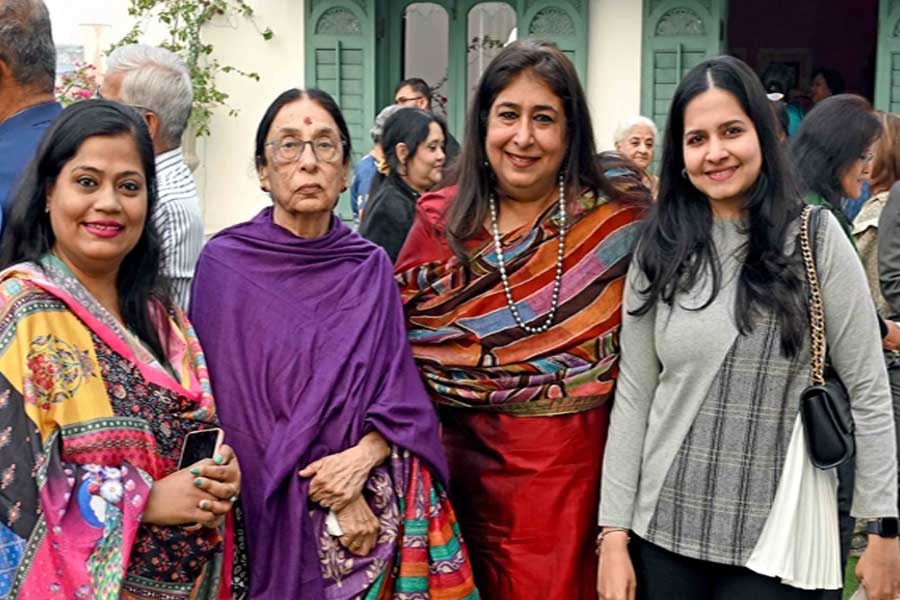
Geeta Dudeja and Malika D. Varma with (right) Prabha Khaitan Foundation’s Manisha Jain and (left) Sudeshna Kundoo
‘In Bhagalpur, criminals would kidnap people, cut them into pieces, and throw them into the Ganges’
The Bhagalpur blindings were a dark time for the police forces, and more so for Manjari, who was directly involved in delivering justice in those cases. “In Bhagalpur, things were so bad that the criminals would kidnap people, cut them into pieces, and throw them into the Ganges,” she said. “The crimes committed were heinous. The police force decided to gouge out the criminals’ eyes and pour acid into them to teach them a lesson. Close to 32 criminals were blinded. On one particular night of bus dacoity, nine people were blinded. This led to a big hungama. The story broke out in the national papers. I was a part of the inquiry into this case by the state government. We faced huge resistance from the people of Bhagalpur – they were in favour of the police officers who had blinded the criminals, not in favour of justice for the criminals.” Manjari’s dilemma was that even though she had finally gotten an important case to solve, she was now expected to investigate against her own men, many of them senior, from the force.
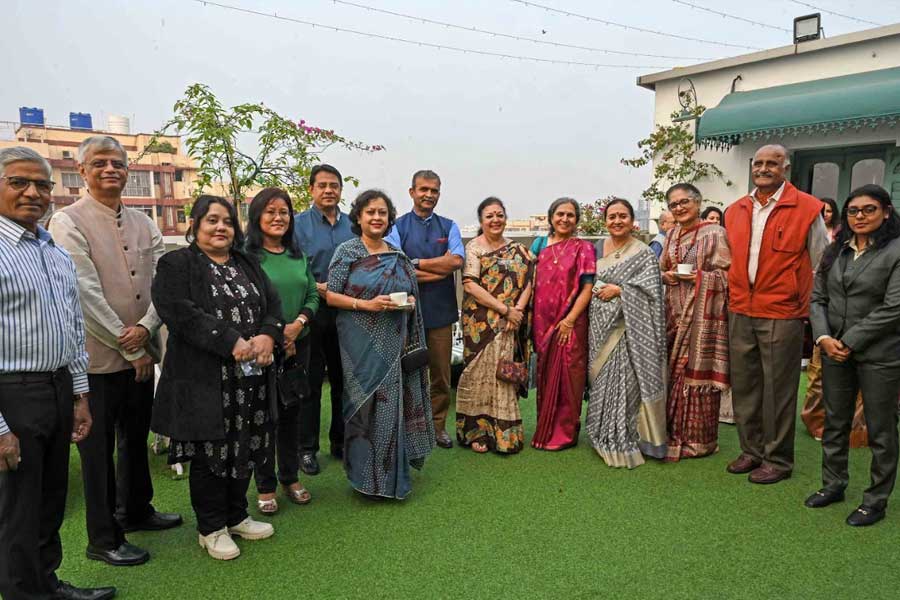
Manjari Jaruhar with friends, other illustrious IPS officers, young officers who have recently joined the force, and cop-crime novelist Monabi Mitra (sixth from left)
Hunterwali vs Madam Sir
Manjari had acquired the moniker ‘Hunterwali’ — a title she confesses she is not too happy to have. “When I joined Bokaro as an SP, rumours were floating around about how I don’t allow couples to travel on motorcycles or women to wear sleeveless blouses! In the 1980s, women were not so visible in uniform, and so stories were spun.”
She also spoke about the birth of Madam Sir, and how it all began. “When I wrote this book, I did so only from memory. I did not have any notes to look back on. In a police officer’s career, we have so many stories to write about, but I decided to write only about what affected me emotionally.” She then went on to read from her book about the Sikh riots following Indira Gandhi’s assassination. The incident affected the entire country in 1984, and the riots were particularly gruesome in her district of Bokaro.
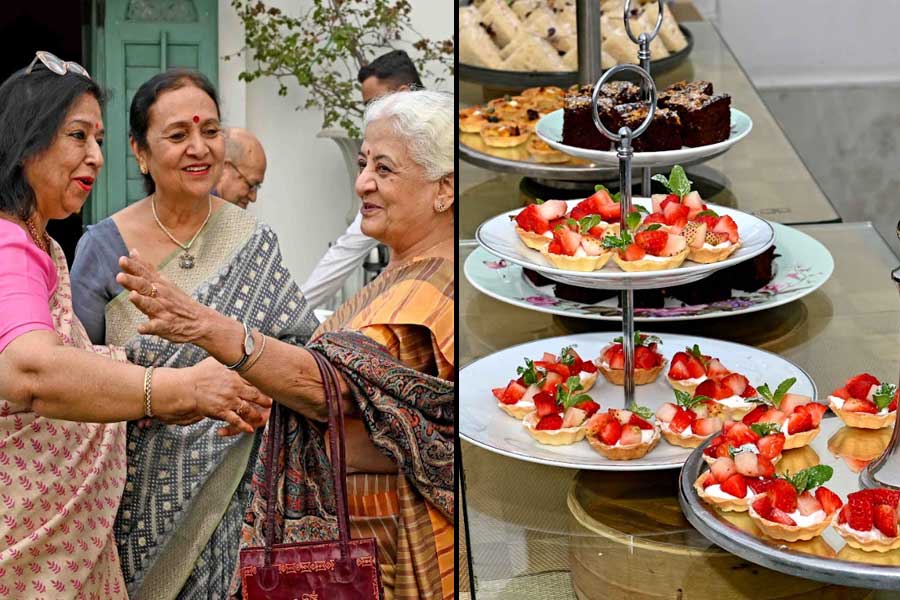
Manjari Jaruhar meets her friends, and (right)The late afternoon spread set up at the Glenburn terrace
So what prepared her to take on such challenges? “There is a year of physical training in the academy, as well as one whole year of practical training in the field, and only then are we given independent charge. So you learn to make decisions based on limited information and time,” said Manjari. She counts the time that she trained young people at the National Police Academy as being among her best years. For the first time in her career, she was treated on a par with everyone else, and was judged not on the basis of her gender, but on the strength of her training and performance.
Manjari also recounted anecdotes about police lingo, from “Madam Sir” to “Huzoor Bahadur”, which was the standard response that subordinates gave their seniors, no matter what was asked of them. “I realised the beauty of the phrase much later,” she said. “It conveyed everything, from ‘yes’ and ‘no’, all the way to ‘I have heard what you have said’.”
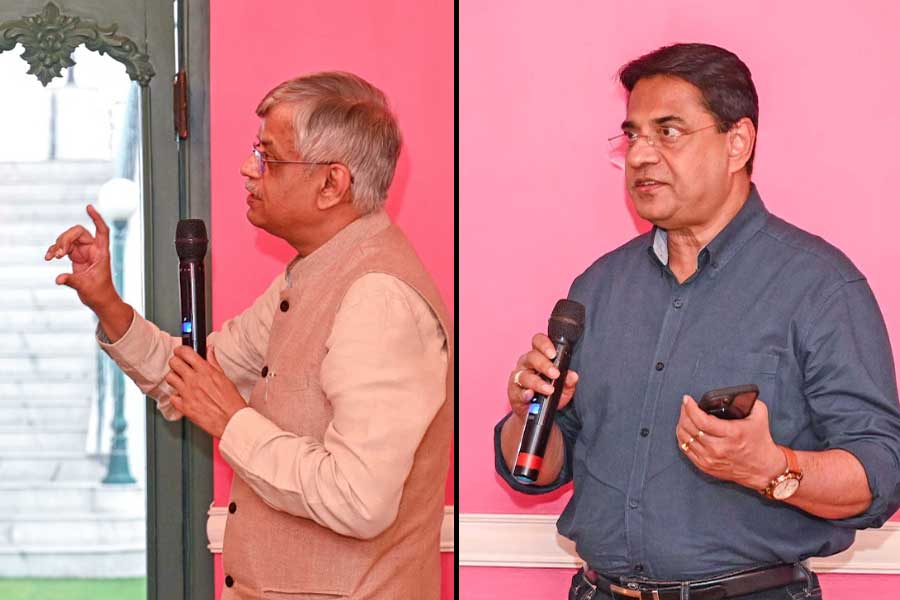
Sudhir Mishra and (right) Soumen Mitra speak about law enforcement practices
Manjari has always believed that the uniform — which was never made for the female body in the first place, she said — was “the great equaliser”. A lot may have changed between her time and today, but there is no hiding from the fact that discrimination still exists. Her message to young women IPS officers now? “The chair is never important, the person occupying that chair is. So make a difference wherever you are.”
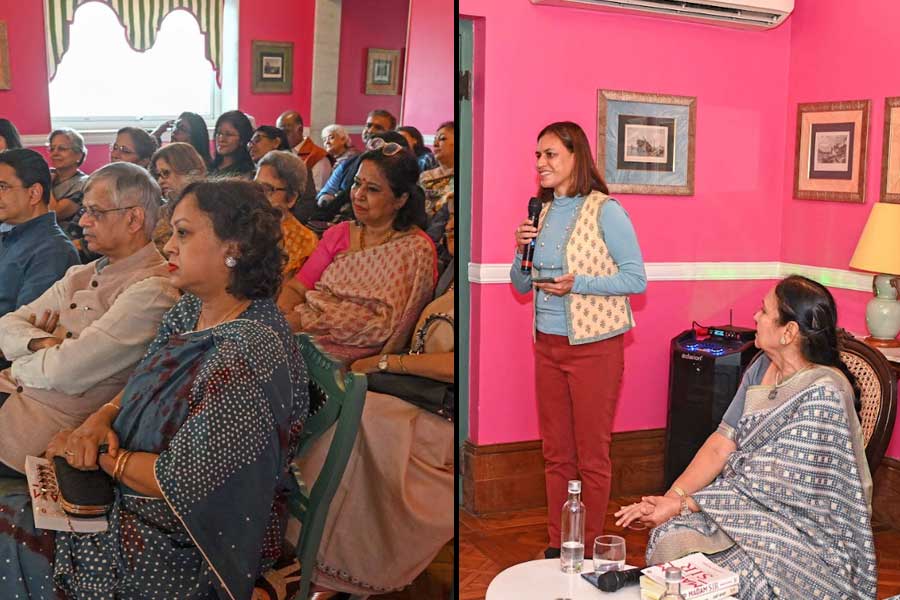
A rapt audience listens to Manjari Jaruhar, and (right) Husna-Tara Prakash, owner, Glenburn Penthouse, gives the vote of thanks
In the labyrinth of law enforcement, where the thin line between good cop and bad cop often blurs, a compelling saga called Madam Sir unfolds against the backdrop of Bihar. The khaki uniform, once symbolising a staunchly male stronghold, now becomes a canvas upon which the first woman IPS officer of Bihar paints a story of resilience, courage, and the relentless pursuit of justice. “This is a story of… never giving up,” writes Manjari’s brother Pramath Raj Sinha – the catalyst behind the book – in the Preface to Madam Sir.
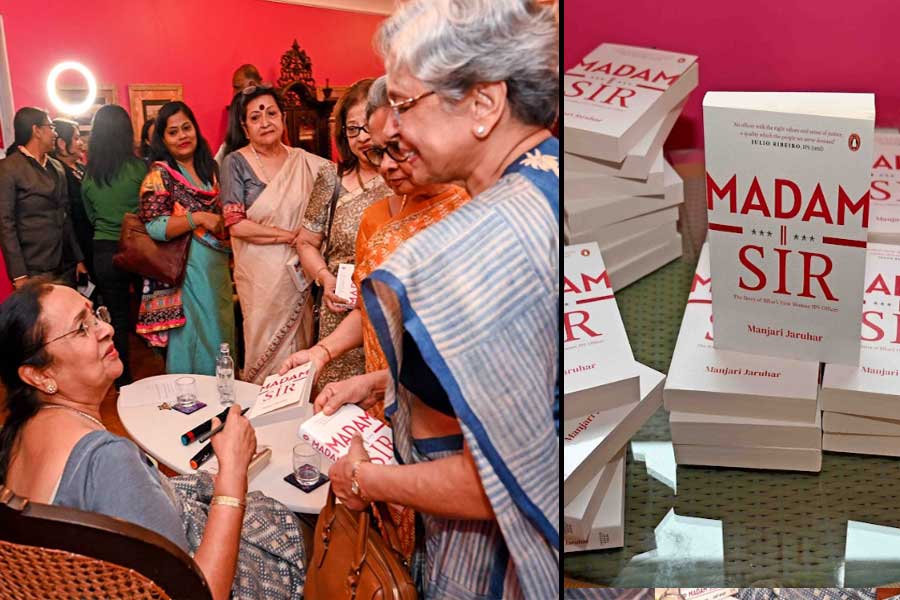
Manjari Jaruhar signs books for her guests, and (right) copies of Madam Sir, published by Penguin Random House India, on display at the Glenburn Penthouse
Guided by Ramona, Manjari spoke about more aspects of, and anecdotes from, her life and career, and emphasised the need to evolve along with the changing times. The evening drew to a close with a Q&A session with the audience, the majority of whom were Manjari’s colleagues and students from the police force. The attendees then got a chance to interact with her, and have their copies of Madam Sir signed by the author.
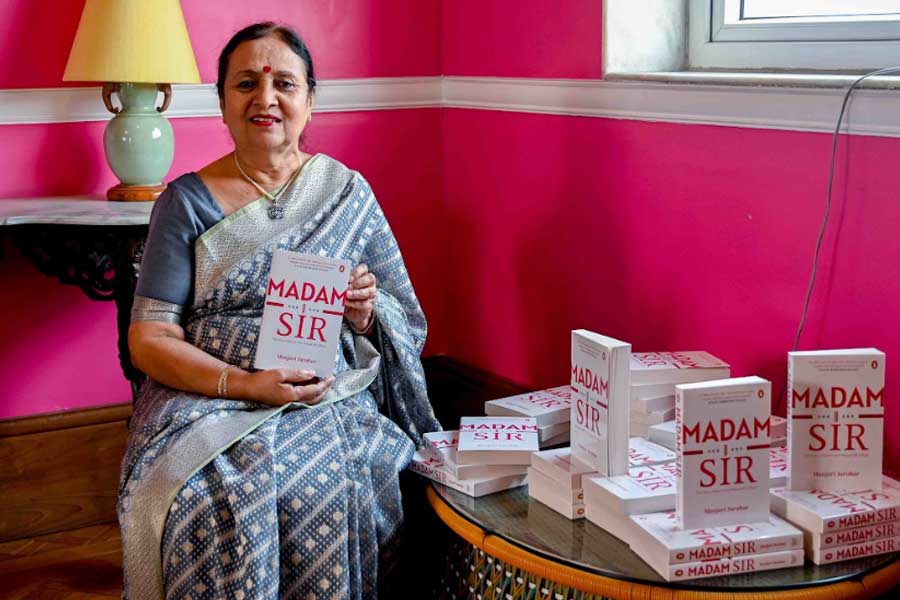
Manjari Jaruhar, Bihar’s first woman IPS officer, with her book Madam Sir
Buy the book here!
